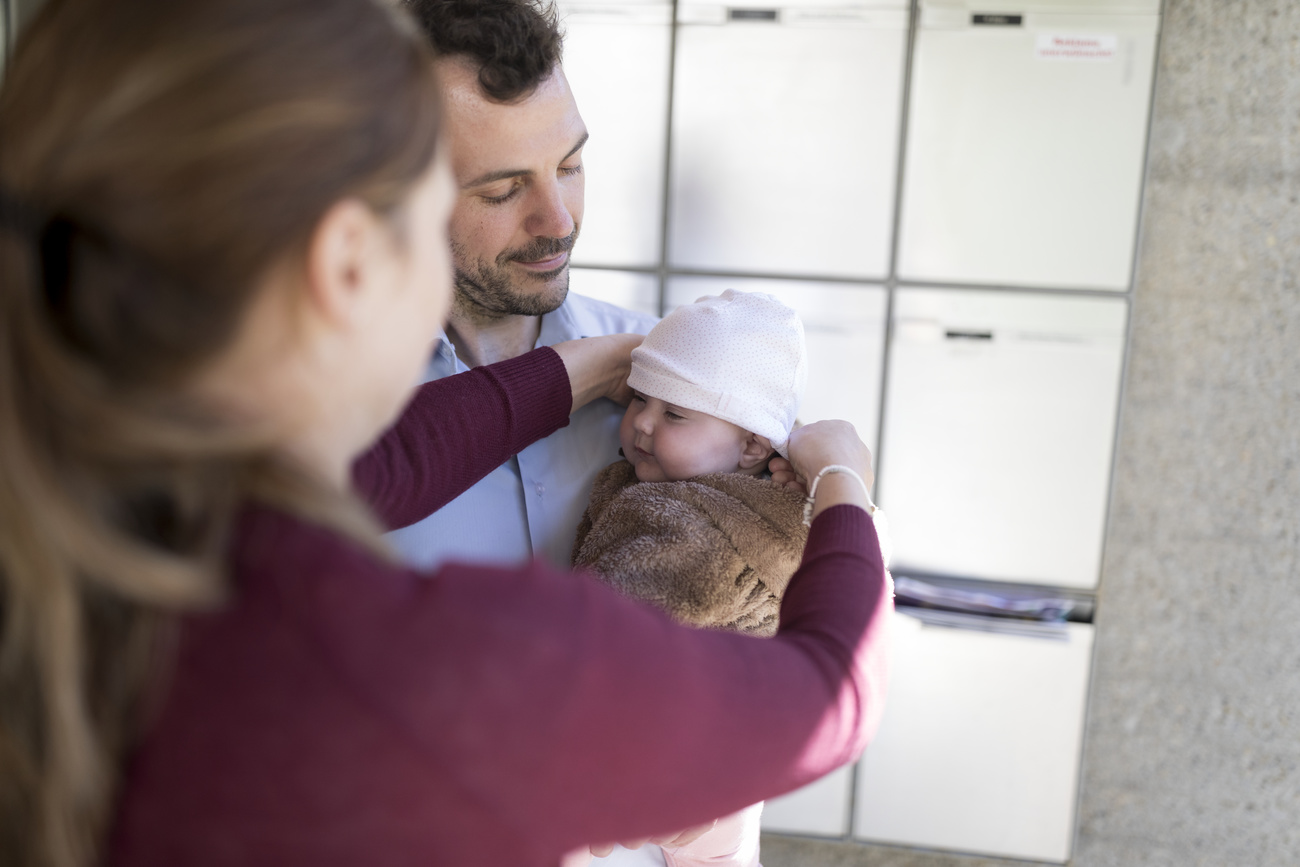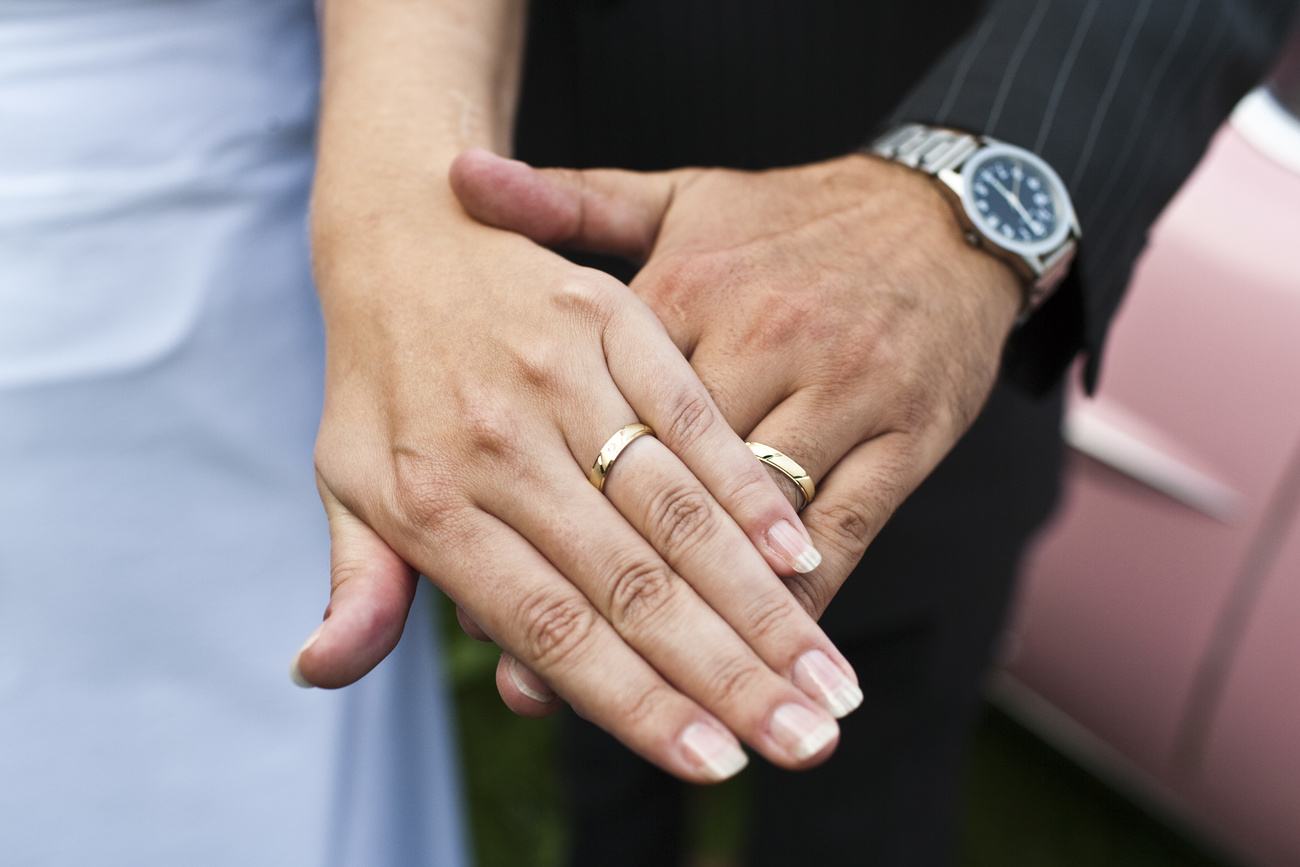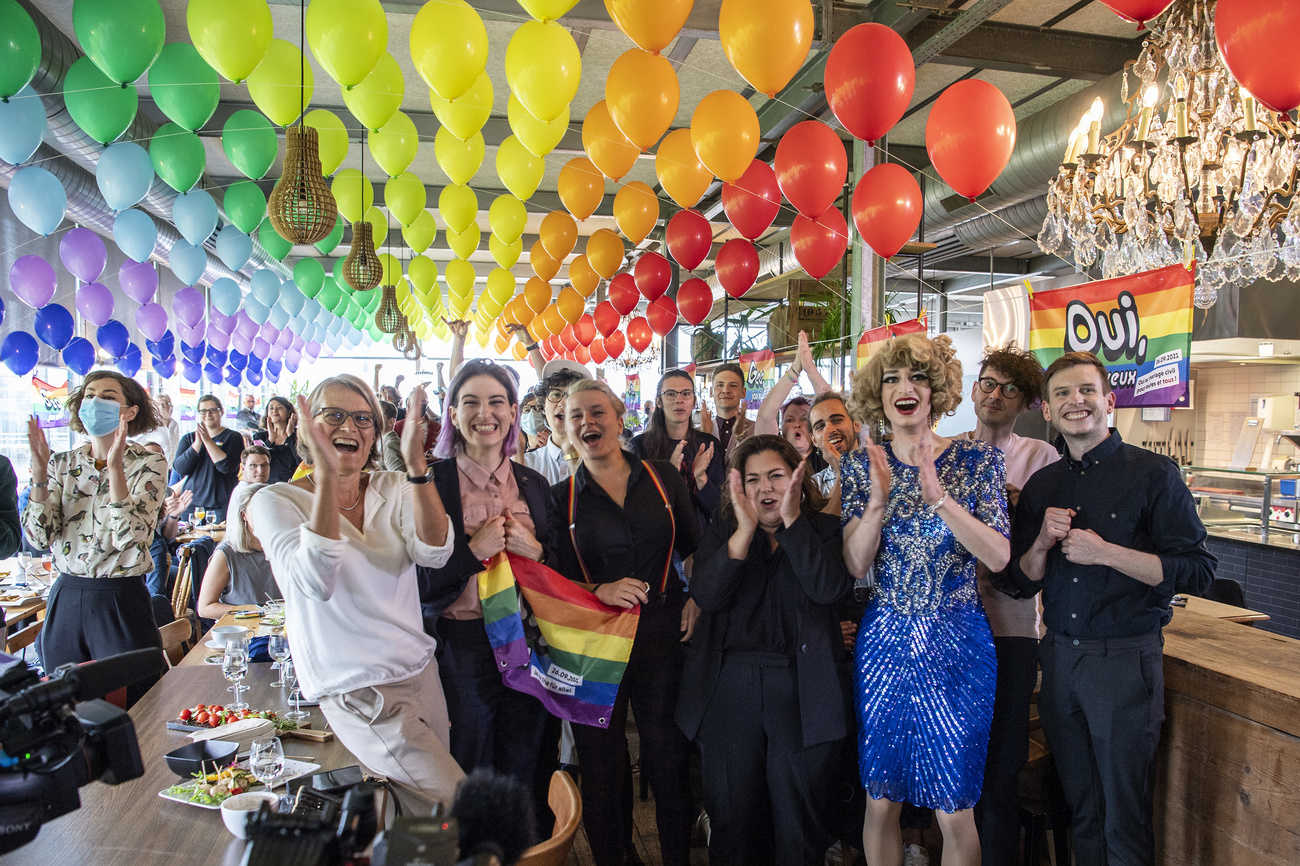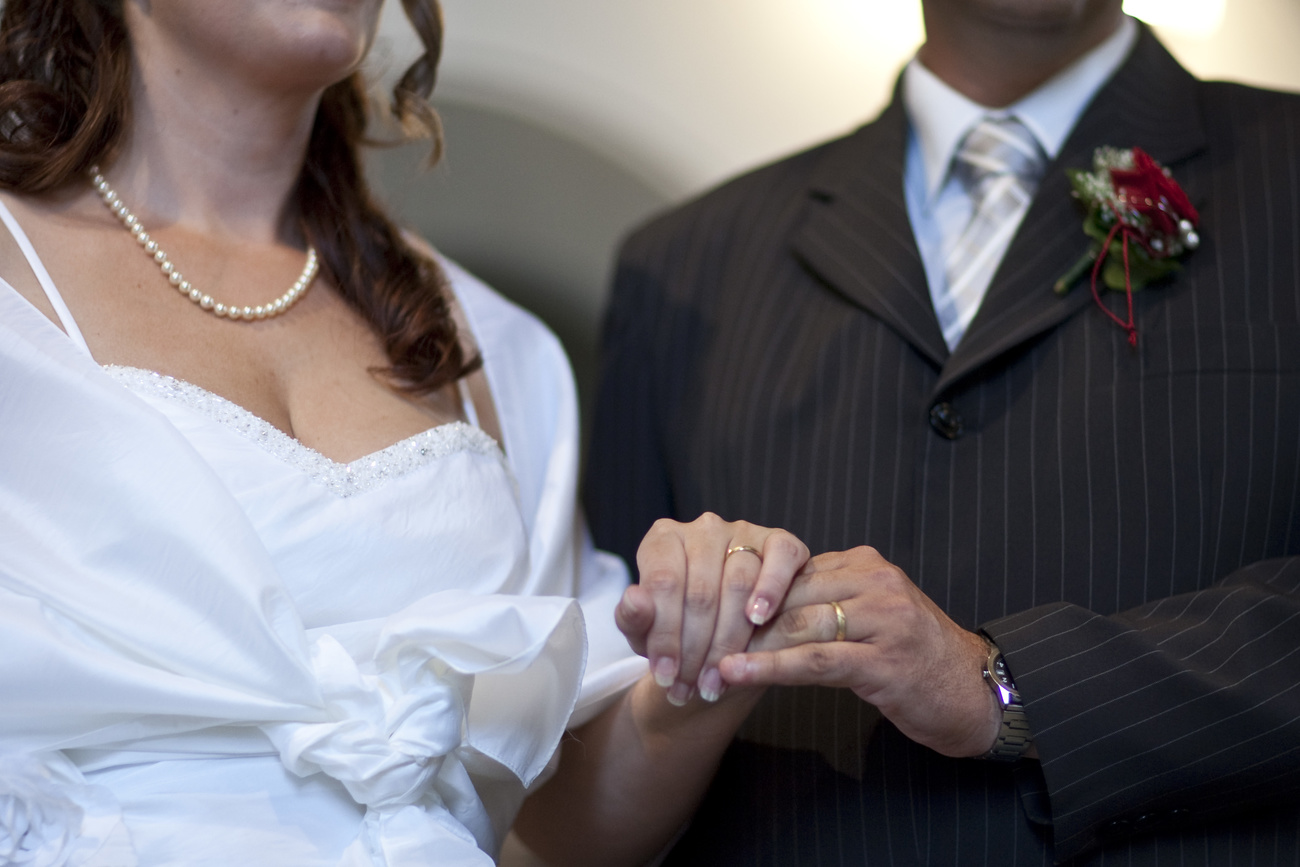Why double surnames are stirring controversy in Switzerland

The Swiss parliament looks set to allow couples to use a double surname again, a decade after it forbid the practice. It isn’t without controversy though.
For ten years, my surname has been an anomaly in Switzerland. I have a double surname – Davis and Plüss (anglicised as Pluess) – without a hyphen. I got married in Switzerland when such double name combinations were allowed. This changed in 2013. Couples were free to choose their own surnames, but double surnames were no longer permitted. At the time this was hailed as a step towards gender equality because it put both husband and wife on equal footing.

More
Switzerland mulls return of double-barrelled surnames
“Equality between spouses in terms of naming rights and civil rights is getting closer,” the federal government wrote in a press releaseExternal link back in 2012, announcing the implementation of the law.
Now parliament looks set to change the rule again. On Thursday the House of Representatives signalled support for bringing back double surnames but had a heated debateExternal link about how to do it and whether the same rules should apply to children.
Why all the back and forth?
A look at the law
Right now, married couples or anyone with children have limited options when it comes to choosing a surname based on the 2013 law. Each person can keep their own name or take the name of their partner as a common family name. This would mean for example, that my husband takes his surname Plüss or my surname Davis if we decide that is the common family name. The same applies to me.
Double names with a hyphen can be used informally but it doesn’t appear in the civil registry. Such is the case of the Swiss Finance Minister Karin Keller-Sutter (Keller being her husband’s name).
The initiative under discussion in parliament wants to give couples more freedom to choose a single or double surname with or without a hyphen. The initiative was first put forward in 2017 and since then has gone through a series of back-and-forth discussions between different commissions and houses of parliament.
In the process, various caveats were introduced. For example, the current bill suggests that if a double name is chosen, everyone in the family must choose the same order. In other words, I couldn’t decide to be Davis Plüss and my daughter Plüss Davis. That’s a no-go.
One spouse could choose to have a double surname and the other a single surname. But the order of the double surname depends on whether there is a common family name, which would come first.
The situation gets even more complicated when it comes to children. For example, what if both partners have double names? Which gets passed on to the child? What happens if the child gets married? Some Swiss media outlets calculated that based on the current proposal, parents could choose from four to ten different naming variants for their kids. Swiss public television, SRF, even developed an interactive toolExternal link for couples to try out their own names.
The equality question
One of the key issues at the centre of the debate is how much naming laws can and should advance equality. Prior to the law change in 2013, couples had to have a common family name – either as a single surname or tacked on to form a double surname, which is what I did. In most cases, the husband’s name became the default family name.
The 2013 law got rid of the requirement for a common family name and each person could keep their own surname but double names were no longer allowed. This was intended to give women, in particular, more freedom to keep their own name. According to a government statementExternal link, there was less interest in expressing family unity through a common name.
But the law change had a surprising result. Most women still took their husband’s name, abandoning their own. In 2019, the Federal Statistical Office reportedExternal link that seven out of ten brides took their groom’s name. A majority of children also have the same name as their father.
There was another hiccup. As double names weren’t allowed, couples (most often women) were forced to choose between their name and their husband’s. This turned out to be a lose-lose choice for many.

More
‘Marriage for all’ wins thumping approval of Swiss voters
“To put it bluntly, they either decide for their individuality or to express their belonging to the family,” Fleur Weibel, a sociologist at the University of Basel, who has researched marriage and surnames in Switzerland, toldExternal link the Neue Zürcher Zeitung in 2021 when debate on the names kicked off in parliament. “The majority do the second, voluntarily, but there is still a certain amount of pressure. It’s not easy to throw established practices and traditions overboard.”
A recent parliamentary legal commission report also expressed concern that the obligation to choose one of two names when marrying or giving birth contradicts the principle of equal rights for parents.
There were also many practical inconveniences. If one parent was traveling abroad and didn’t share a surname with their child, they had to show proof that they were the parent. Another issue was that exceptions were made for foreigners or Swiss who were married abroad under different laws.
Family forms have also evolved over the last decade. As of July 2022, same-sex couples have the right to marry in Switzerland under the same conditions as opposite-sex couples. Many couples in Switzerland never marry. Some want to change their name after a divorce or they remarry.
Bigger than Switzerland
Switzerland isn’t alone in rethinking naming conventions. In March, six couples sued the Japanese governmentExternal link over a law that requires married spouses to have the same surname. They argued that the century-old custom perpetuated inequality. More Japanese women are working and want to maintain their own identity – a key part of which is their name.
Last year, Germany also launched discussions on a draft lawExternal link to liberalise rules on double-barrel surnames for couples and children.
But there are many places where governments have been more hands-off. Tradition rather than law dictates surnames in Brazil. Most people have a surname consisting of their mother and father’s surname. They pass one of these on to their children.

More
Switzerland moves to scrap unfair tax on married couples
In Spain, children receive the first surname of their father and mother, and the parents can determine the order. The United States and Canada also have flexible laws on naming. In most provinces in Canada, people are free to take a spouse’s name or have a double name except in Quebec, which forbids women from taking their husband’s name.
In the United Kingdom, married couples can also choose from a variety of options, even developing a new name: for example, Smith and Jones could become Smones.
The debate in Switzerland isn’t over yet. On Thursday the House of Representatives decided to kick the can down the road, sending the initiative back to the legal affairs committee for further review. While there was wide agreement on reintroducing double surnames for couples, many parliamentarians called for simpler rules and more clarity on how they should be applied to children.
Edited by Virginie Mangin/dos. Additional reporting provided by Ruiko Ono and Geraldine Wong Sak Hoi.
Correction: this article was updated to reflect that prior to 2013, couples could choose the common family name but the husband’s name was the default.

In compliance with the JTI standards
More: SWI swissinfo.ch certified by the Journalism Trust Initiative









You can find an overview of ongoing debates with our journalists here . Please join us!
If you want to start a conversation about a topic raised in this article or want to report factual errors, email us at english@swissinfo.ch.